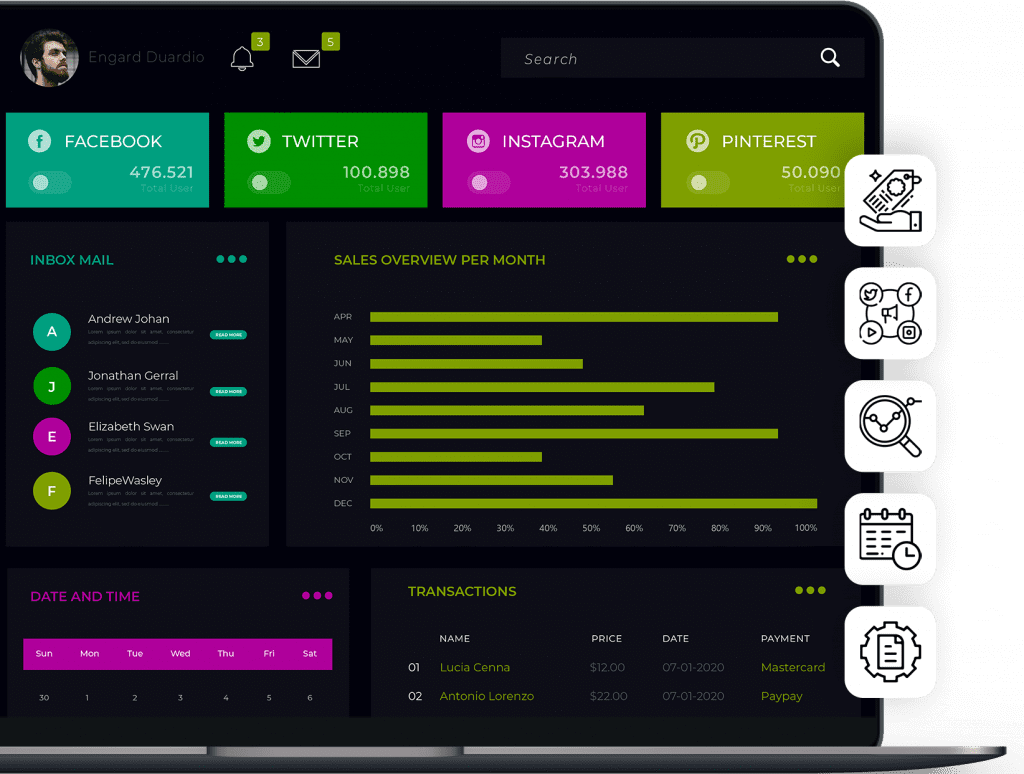
Introduction Are you worried that your website might get affected by the latest Google algorithm up...
If you are reading this, ask yourself, for how long have you been in this business, and what is your position? Do sales increase each month? How often do you interact with customers? And if you do not have answers to these questions, you are on the right page.
We can assist you in improving marketing on popular social platforms. With our solid social media marketing plan, you would notice a visible difference in traffic on social media pages. You would also observe engagement with the targeted audience and intensified brand recognition.
Whether your business is old or a startup, B2B industry, or B2C, social media networks marketing has majorly impacted the market. It is one of the most straightforward reasons giant companies or small but recognized enterprises invest in Social media marketing services.
Our professionals have been in digital marketing for over a decade; they are well-versed in various marketing tactics. Considering Google algorithms and social media trends, we create a strategic social media campaign agenda to run your social media. Starting with brand awareness, we bring more traffic to encourage participation. Then, slowly and steadily, we make progress in generating leads and sales.
Social Media Advertising services require both innovation and strategy. While it may seem massive, its importance cannot be neglected. Almost 97% of business owners are using marketing tactics to increase their social media presence. Its benefits are far better than just increasing sales.
Many small businesses are unaware of the benefits of marketing channels and hence are unable to leverage their potential. However, social media would help them increase their traffic, grow brand awareness, and promote their products online.
Social Media offers numerous benefits. However, gaining brand popularity is one of the main concerns of using social media. This is because most people prefer buying from recognized brands. WeDoWebApps LLC can help you with easy and professional brand building.
A strong social media presence may bring a conversation about your brand. Additionally, using social media, you can share your brand’s mission and vision with your customers. Doing this will have a great impact on your brands’ revenue. Good content creation along with effective content marketing can significantly improve your brand’s value.


Strategy Planning: Creating a strategy for social media is vital for your business. Many small businesses start promoting their online business without setting their goals. Creating a content strategy ensures that you have a plan set out for what works best for your customers. Strategic planning works for spreading the word for your organization.
Research and Analysis: Social Media Marketing services do not end once the content is posted and ads are run. It needs a lot of research to ensure that the content is reaching the right audience at the right time. We help you to keep track of your information to improve wherever needed.
Platform-Specific Social Media Marketing: Every social media platform offers a little different from the other platforms. It is important for you to know which platform works best for your business. Every platform you choose has a certain targeted audience; therefore, invest in a platform that is worth your business.
Profile Creation and Branding: There are so many brands that do not think of creating their profiles on social media. Don’t be one of them. If you are a brand, hire a social media marketing company that helps you to reach social media profiles and in branding. This would literally help you in the long run.
Social Media Content Management: There are brands that monitor and control their social media platforms on their own. But, if you cannot post or schedule, our social media content managers can help you with the timely posting of your content on social channels.
Our primary focus is to provide you with the best analytical, result oriented social media marketing services. Unlike other online marketing companies, we operate from the business owner’s perspective. We maintain to be in the competition providing the following marketing services to our clients:
Highly dedicated Social Media Account Manager: A person that is an expert on all the social media channels. The expert will understand your business and guide you.
Regular Monthly Reports: When you hire us, it is important for you to know the numerical reports of your business. We provide you with monthly reports to keep you posted with your company’s branding.
Dedicated, supportive team: Our dedicated team includes designers, analysts, and a professional content writer. They would help you create engaging and unique posts for your social media accounts.
Access to Analytical Software: Since better data drives better results, we teach you to track or analyze your data using Analytical tools.
We are a Social Media Marketing Company that believes in a performance that brings the desired outcomes. Hire online marketing experts from WeDoWebApps LLC to see significant results through social media.

If you are looking for social media marketing professionals, we are here to help. With our dignified portfolio and knowledgeable marketers, we can bring a revolutionary and never-before transformation by applying strategic SMM methods. In addition, we engage the audience with various fun quizzes, fun facts, social ads, and relevant content.
Our Social media experts create effective campaigns for paid advertising of your business. To put you ahead of the competition, with our marketing efforts and we create strategies that would proliferate your business. When you hire experts from us, you get access to advanced skills and benefit from our decades of experience.
We analyze the market scenario, your competitors, and pertinent audience and then execute our game plan. If necessary, we also implement influencer marketing to get you brand recognition. Thus, we have been a reliable and constant source of improvement for many of our clients. We plan to continue the same for our upcoming clients as well.

We empower healthcare administration with our full-fledged mobile applications.

Draw your potential customers to your business with an online food chain facility application.

Go on next-level to expand your sports business using leveraging mobile app solutions.

Elevate learning experience with our highly compatible education app that makes learning fun.

Make most of it by using an app to enhance the entertainment experience from sound to HD videos.

When your customers’ comfort matters the most, we offer an app that works in your favor.

We are here to assist you with the safest transaction, secure banking, and smooth financial solutions.

Boost your local business to be global. Find unique solutions for your E-commerce and retail business.
Analyzing your business and its requirements, we create an effective and result oriented marketing strategy that perfectly suits your business. We promise to use marketing tools that can get you engagement and increase sales.
If we talk about how much you should spend on social media, It is merely difficult to put the exact number. Let’s say, whenever you release an ad on Facebook, you need to invest $10. We don’t put ad spend on everything we post on social channels, but when we do, it is about $25. It is clear that more investment would get you more results, but that would take you a long way.
Creating multiple social media posts and scheduling them ahead may save you a lot of time. There are various tools like Facebook Business Manager, TweetDeck, Hootsuite. However, since all the platforms do not allow you to schedule in advance, we choose the platforms as per your requirements.
Apart from the scheduling tools mentioned above, we use Google docs to write and edit the social posts collaboratively. We also use PhotoShop and Adobe Spark to create fascinating social media posts.
Of Course, Yes. Almost every social media platform gives you the freedom to keep only those comments that can increase your brand’s reputation. Therefore, the bad ones can be deleted to maintain your brand’s prominence.
Easy to use, but hard to get. Social media experts can create strategies that can be beneficial for your organization. An expert can help you build a strong online presence and engage with new and current customers. Whether you want to increase your brand awareness or promote your business online, we have got experts for you.
Besides social media marketing, we offer search engine optimization, search engine marketing, social media optimization, and many other Digital Marketing Services.
Believe it or not, but, the whole world has become small because of social media. Most of us have gone social and spent the majority of our free time on social platforms. If you want to be in front of your audience quite often, spread the word, engage users, and increase traffic on your website, social media marketing is an effective way.
When we talk about SMM, we mean Facebook, Instagram, Twitter, Pinterest, and many more. On the other hand, it depends on your business industry, the user base, and the goals you wish to conquer. We assist after analyzing the market and ongoing trends.
If you are trusting us, this is not something you need to worry about. However, for the sake of your knowledge, the number of posts depends on how behind you are or how quickly you want to be recognized. It can be two posts a day or two posts a week; creating brand awareness is the primary goal here.